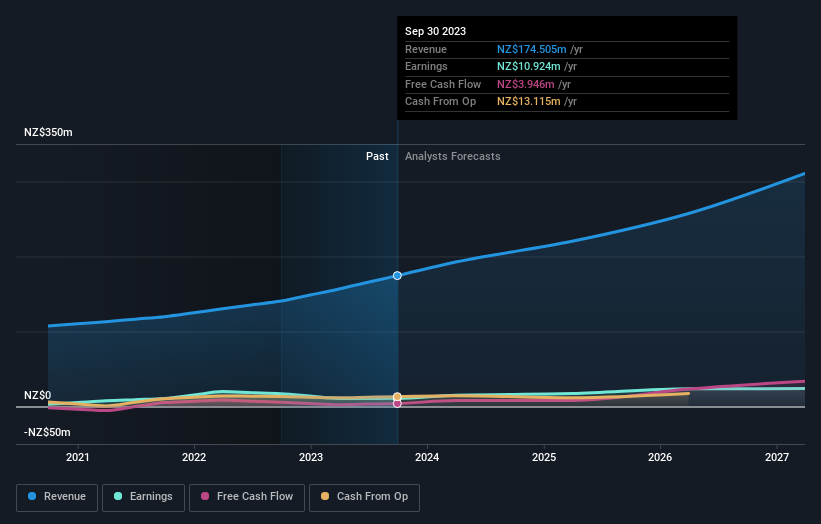AFT Pharmaceuticals Limited (NZSE:AFT) insiders have significant skin in the game with 70% ownership
Key Insights
AFT Pharmaceuticals' significant insider ownership suggests inherent interests in company's expansion
Hartley Atkinson owns 69% of the company
Analyst forecasts along with ownership data serve to give a strong idea about prospects for a business
A look at the shareholders of AFT Pharmaceuticals Limited (NZSE:AFT) can tell us which group is most powerful. We can see that individual insiders own the lion's share in the company with 70% ownership. That is, the group stands to benefit the most if the stock rises (or lose the most if there is a downturn).
So it follows, every decision made by insiders of AFT Pharmaceuticals regarding the company's future would be crucial to them.
In the chart below, we zoom in on the different ownership groups of AFT Pharmaceuticals.
View our latest analysis for AFT Pharmaceuticals
What Does The Institutional Ownership Tell Us About AFT Pharmaceuticals?
Institutional investors commonly compare their own returns to the returns of a commonly followed index. So they generally do consider buying larger companies that are included in the relevant benchmark index.
We can see that AFT Pharmaceuticals does have institutional investors; and they hold a good portion of the company's stock. This implies the analysts working for those institutions have looked at the stock and they like it. But just like anyone else, they could be wrong. It is not uncommon to see a big share price drop if two large institutional investors try to sell out of a stock at the same time. So it is worth checking the past earnings trajectory of AFT Pharmaceuticals, (below). Of course, keep in mind that there are other factors to consider, too.
Hedge funds don't have many shares in AFT Pharmaceuticals. The company's CEO Hartley Atkinson is the largest shareholder with 69% of shares outstanding. With such a huge stake, we infer that they have significant control of the future of the company. It's usually considered a good sign when insiders own a significant number of shares in the company, and in this case, we're glad to see a company insider with such skin in the game. Accident Compensation Corporation, Asset Management Arm is the second largest shareholder owning 4.6% of common stock, and Apex Group Ltd. holds about 2.8% of the company stock.
While studying institutional ownership for a company can add value to your research, it is also a good practice to research analyst recommendations to get a deeper understand of a stock's expected performance. There are a reasonable number of analysts covering the stock, so it might be useful to find out their aggregate view on the future.
Insider Ownership Of AFT Pharmaceuticals
The definition of company insiders can be subjective and does vary between jurisdictions. Our data reflects individual insiders, capturing board members at the very least. Company management run the business, but the CEO will answer to the board, even if he or she is a member of it.
I generally consider insider ownership to be a good thing. However, on some occasions it makes it more difficult for other shareholders to hold the board accountable for decisions.
Our most recent data indicates that insiders own the majority of AFT Pharmaceuticals Limited. This means they can collectively make decisions for the company. So they have a NZ$230m stake in this NZ$330m business. Most would be pleased to see the board is investing alongside them. You may wish todiscover (for free) if they have been buying or selling.
General Public Ownership
The general public-- including retail investors -- own 21% stake in the company, and hence can't easily be ignored. While this group can't necessarily call the shots, it can certainly have a real influence on how the company is run.
Private Company Ownership
We can see that Private Companies own 3.6%, of the shares on issue. It might be worth looking deeper into this. If related parties, such as insiders, have an interest in one of these private companies, that should be disclosed in the annual report. Private companies may also have a strategic interest in the company.
Next Steps:
It's always worth thinking about the different groups who own shares in a company. But to understand AFT Pharmaceuticals better, we need to consider many other factors. Consider for instance, the ever-present spectre of investment risk. We've identified 2 warning signs with AFT Pharmaceuticals , and understanding them should be part of your investment process.
But ultimately it is the future, not the past, that will determine how well the owners of this business will do. Therefore we think it advisable to take a look at this free report showing whether analysts are predicting a brighter future.
NB: Figures in this article are calculated using data from the last twelve months, which refer to the 12-month period ending on the last date of the month the financial statement is dated. This may not be consistent with full year annual report figures.
Have feedback on this article? Concerned about the content? Get in touch with us directly. Alternatively, email editorial-team (at) simplywallst.com.
This article by Simply Wall St is general in nature. We provide commentary based on historical data and analyst forecasts only using an unbiased methodology and our articles are not intended to be financial advice. It does not constitute a recommendation to buy or sell any stock, and does not take account of your objectives, or your financial situation. We aim to bring you long-term focused analysis driven by fundamental data. Note that our analysis may not factor in the latest price-sensitive company announcements or qualitative material. Simply Wall St has no position in any stocks mentioned.

 Yahoo Finance
Yahoo Finance 

